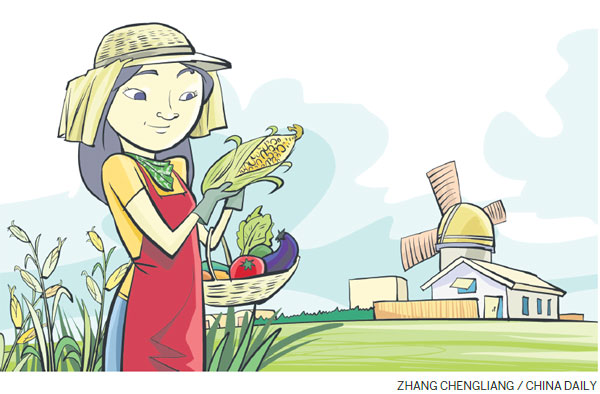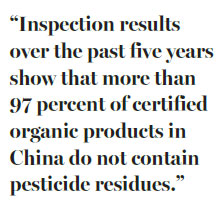The green shoots of organic growth

China embraces the production of food free from potentially harmful substances as it applies strict standards to inspection
In recent years, with increasing awareness of health, the environment and food safety among Chinese consumers, organic products - produced without synthetic pesticides and fertilizers and not containing genetically modified elements - have been gaining popularity in China.
Safety and quality of food and agricultural products has been improved through organic certification. Inspection results over the past five years show that more than 97 percent of certified organic products in China do not contain pesticide residues and, in the few products which do, the residue level is far below national compulsory standards for nonorganic products. This shows that the quality of organic food certification in China is on a par with that in developed countries. Pesticide residue levels are far higher in nonorganic products.

By developing organic farming and processing, the use of fertilizers and pesticides during agricultural production can be greatly reduced. Based on figures released by China's Ministry of Agriculture, it is estimated that the organic industry in China contributed to a reduction in the use of fertilizers by 47,800 metric tons and pesticides by 3,000 tons in 2015, accounting for 1 percent of the total use of such products in China that year.
Developing the organic industry is important for China. It stresses the ecological nature of agricultural development, respects rules of ecological economy and stresses optimization and integration of ecological, economic and social benefits. It embodies the concepts of a green and low-carbon economy and promotes recycling. With the deepening of reform in China, problems in agricultural development have become more prominent, such as the widening gap between supply and demand for high-quality products, and the oversupply of lower-end products. Therefore, supply-side structural reform is urgently needed to promote sustainable growth of agriculture and income for farmers. Developing the organic industry can be a good contributor to reform.
The Communist Party of China Central Committee and the State Council, China's Cabinet, have in recent years issued guidelines for accelerating the development of ecological civilization, calling for the speeding up of development of the organic industry and a market oriented mechanism for certification of organic products. According to the guidelines, the General Administration of Quality Supervision, Inspection and Quarantine and Certification and Accreditation Administration should take the lead in establishing a unified national system for standardization, certification and labeling of green products. Organic products are an important part of the green product system and will attract more financial support for research and development, transportation, distribution, purchase and consumption, as well as better policy support in government procurement.
Following instructions from the State Council, China's former general administration of environmental protection handed over its duties for supervision of organic product certification to the CAA in 2004. Since then, GAQSIQ and CAA have released a series of regulations, rules and standards for organic products, their certification and supervision. Thus, a unified national system has been established for the certification and accreditation of organic products by adopting international standards. Under the system, the CAA is in charge of supervision of organic certification and coordinates with provincial-level quality supervision authorities and exit-entry inspection and quarantine authorities directly supervised by the GAQSIQ to supervise certification of organic products within their jurisdictions. Meanwhile, organic certification institutes can conduct business after approval from the CAA.

China has made improvements in its organic product certification system since 2012. First, it has imposed stricter requirements on production, processing, labeling and selling of organic products. For example, sellers must have a permit and label every product with an electronic code for information tracking. They cannot label products as organic if they were produced on land in transition to organic production. Procedures for awarding organic certificates are becoming stricter and more regulated. For example, supervision staff must do on-site inspections of products produced during every season and must test all certified products. China has established a withdrawal system for enterprises that lack credibility, so awarding institutes cannot accept certification applications within five years from enterprises whose certificates have been revoked due to lack of credibility or use of banned materials. The catalog on certification of organic products, which specifies the kind of products that can be certified as organic, is constantly updated. Supervision authorities have established a tracking system covering the whole chain of organic production and distribution to ensure that every product is labeled with a code that can track down information about the product, its certificate and producer. The public can verify authenticity of organic products with the codes at the website food.cnca.cn.
Through improving the certification and supervision mechanism, irregularities in the certification of organic products in China have been effectively checked. China's organic product certification system has become the strictest in the world. Despite stricter supervision, certification is steadily increasing, and both the quantity and sales volume of organic products in China have increased by more than 30 percent every year in recent years.
In 1990, SKAL, an organic certification institute in the Netherlands, awarded a certificate to the organic tea production base in Zhejiang province, marking the beginning of China's move to organic agriculture. Twenty-seven years later, many countries are looking forward to acquiring organic certification from China, which is necessary for them to sell organic products in the country.
In the 1990s, the major reason for China to develop organic agriculture was to export products to developed countries and earn foreign exchange. Now, however, organic products are being produced to meet the requirements of the large number of domestic consumers. Organic products are available in supermarkets and stores in almost all big and midsized cities. Globally, organic is the fastest developing sector in the food industry and China is among the top five in the world for organic farming, production and sales volume. China's CAA and New Zealand's Ministry for Primary Industries signed an agreement on mutual recognition of each other's organic products at the end of last year. China is also negotiating with some countries, including the United Kingdom, Denmark, Thailand and Mexico, for mutual recognition of organic certification.
Looking globally, China's organic industry is facing opportunities of strategic importance and will doubtless become a leader in green, ecological and new-pattern development, which will play an important role in the country's efforts to build a comparatively well-off society.
The author is deputy director of the China Certification and Accreditation Institute, and a former official of China's Certification and Accreditation Administration. The views do not necessarily reflect those of China Daily.
(China Daily Africa Weekly 06/23/2017 page8)
Today's Top News
- Crossing a milestone in the journey called Sinology
- China-Russia media forum held in Beijing
- Where mobility will drive China and the West
- HK community strongly supports Lai's conviction
- Japan paying high price for PM's rhetoric
- Japan's move to mislead public firmly opposed






























